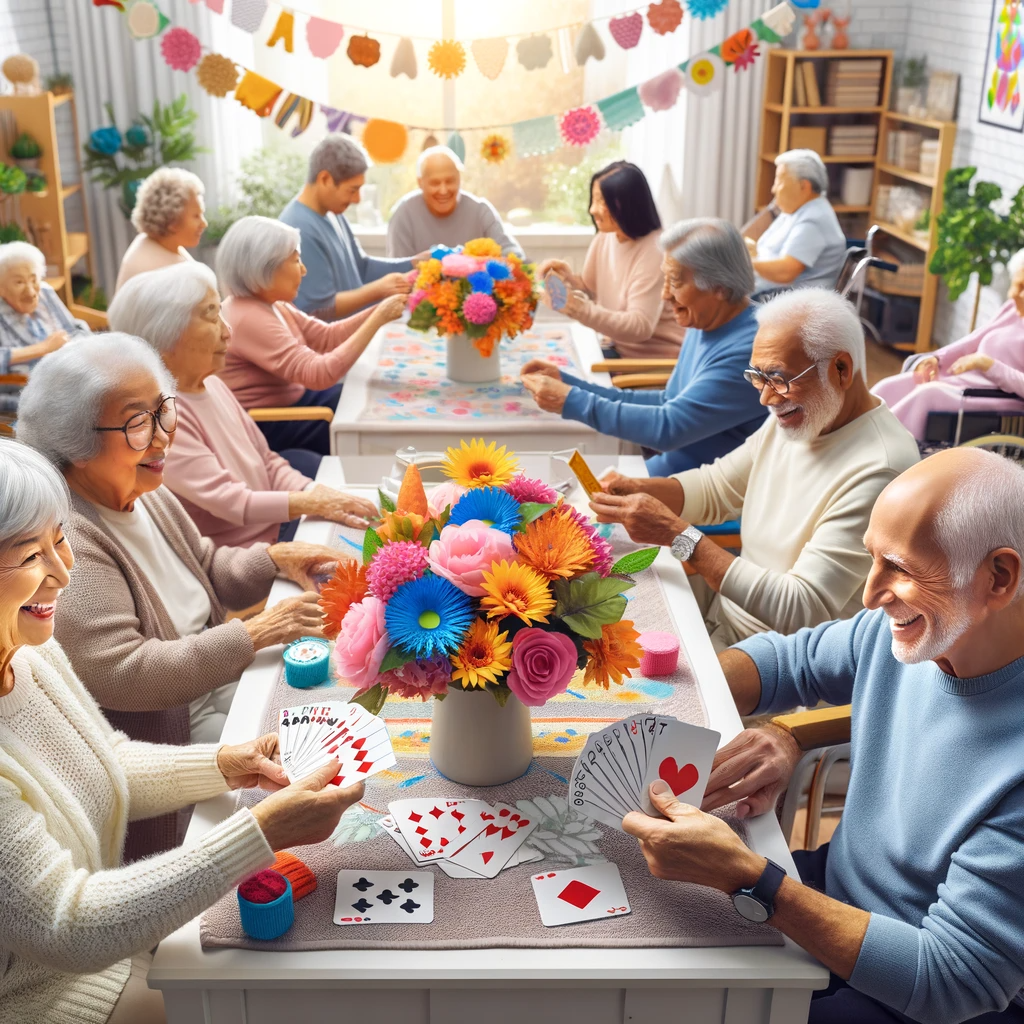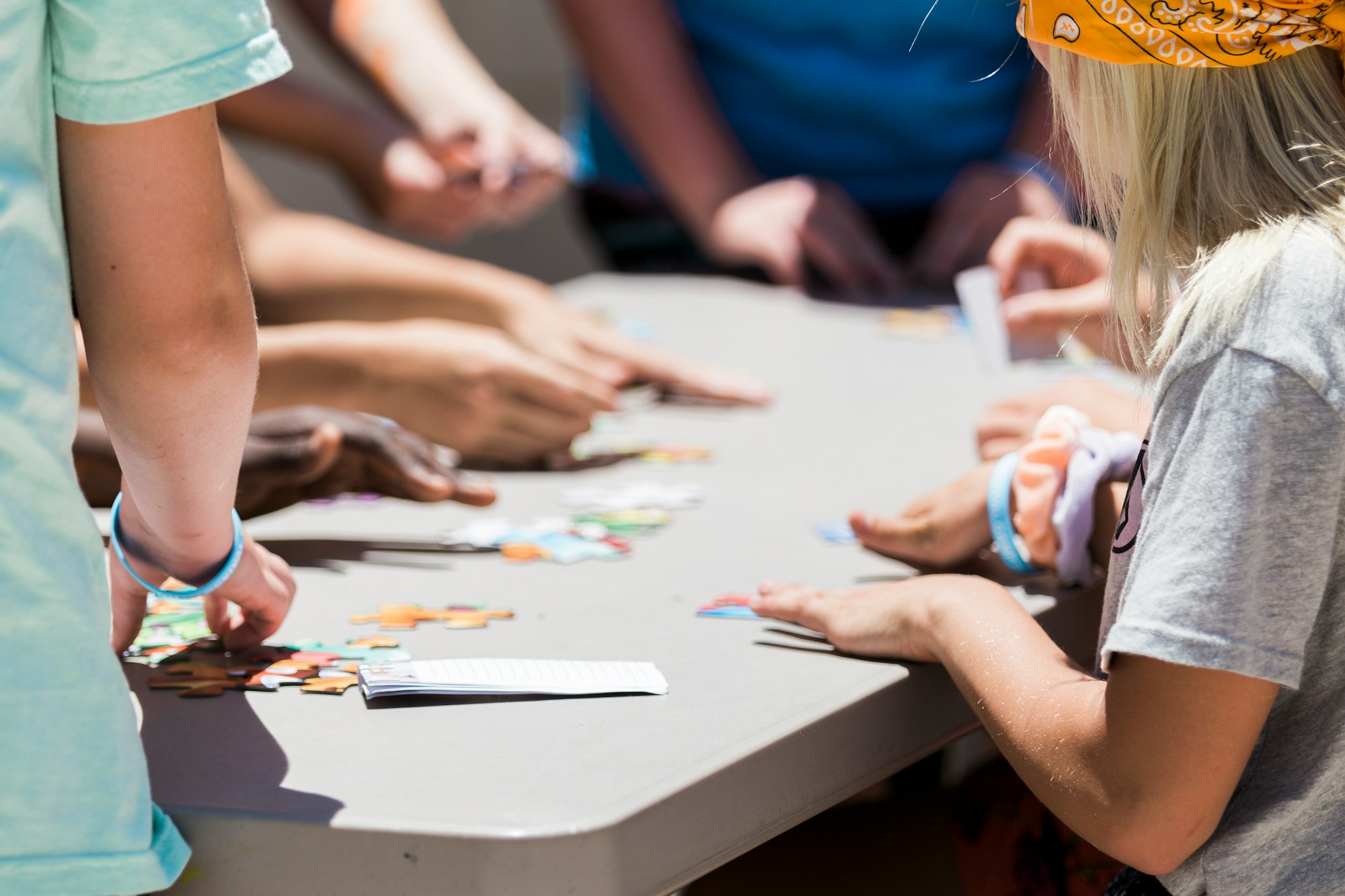Memory Care Games: Enhancing Cognitive Health and Joy in Dementia Care
Explore a range of memory care games for dementia patients, designed to enhance cognitive skills and function. From card games like gin rummy to sensory activities like flower arranging, discover engaging activities for every stage, bringing joy and stimulation to loved ones.

Memory care games are essential tools in managing cognitive decline, particularly in older adults living with dementia. These games offer more than just entertainment; they are key in maintaining cognitive abilities, evoking fond memories, and encouraging social interaction. This document explores various games, from card and board games to creative activities, tailored to individuals at different dementia stages.
Understanding Dementia and Cognitive Decline
Dementia is a collective term used to describe various symptoms of cognitive decline, such as forgetfulness, difficulty in thinking, problem-solving, or language. Dementia affects many seniors, and as it progresses, it impacts daily management and quality of life. While there's no cure, engaging activities like memory care games can significantly benefit those living with dementia.
The Role of Games in Memory Care
Games serve multiple purposes in dementia care. They provide mental stimulation, helping to slow cognitive decline and maintain cognitive functions. Additionally, they can evoke fond memories, boosting emotional well-being. For family members, these games are a way to connect with their loved ones, making them an integral part of dementia care.
Types of Games and Their Benefits
Card and Board Games:
Classics like 'Play Rummy' and other simple card games help with memory recall and hand-eye coordination. Board games can be fun and engaging, stimulating cognitive skills and offering social interaction opportunities.
Memory Games:
Specifically designed for memory enhancement, these games can range from matching games to more complex ones that challenge the brain.
Word Games:
Beneficial for both early and later stages of dementia, word-based games like crosswords or word searches help in maintaining language skills.
Jigsaw Puzzles:
Ideal for early stages or those with mild cognitive impairment, puzzles are excellent for hand-eye coordination and cognitive activity.
Electronic Games:
With the advent of technology, electronic games on devices like cell phones have become popular. They offer new ideas and engaging ways to stimulate the brain.

Sensory and Tactile Activities:
For those in the late stages of dementia, sensory activities like arranging flowers, folding laundry, or tactile stimulation with different textures can be soothing and engaging.
Creative Activities:
Encouraging creativity through activities like painting or working with bright colours can be both fun and therapeutic.
Social Interaction Games:
Games that promote social interaction, such as participating in group activities or reminiscing over old photo albums, are crucial for emotional well-being.
Choosing the Right Game
Stage of Dementia:
It’s important to choose games based on the individual's dementia stage. For instance, in the early stages, more complex games might be suitable, while in the severe stages, simple, sensory-focused activities are more appropriate.
Personal Preferences:
A person's past hobbies and interests should guide the choice of games. A former gardener might enjoy arranging flowers, while a book lover might find joy in word games.
Physical Abilities:
Consider the physical and cognitive abilities of the person. Avoid games that are too complex or physically demanding.
Safety and Comfort:
Ensure the games are safe and comfortable to play. Avoid anything with small parts or sharp edges, and ensure the game environment is well-lit and comfortable.
Implementing Memory Care Games
Routine:
Incorporate games into daily routines for consistency and to build a sense of familiarity.
Family Involvement:
Encourage family members to participate. This can be a fun way to spend quality time together and maintain emotional connections.
Professional Guidance:
Consult with professionals in dementia care for new ideas and guidance on the most suitable games.
Adaptability:
Be prepared to adapt games as the dementia progresses. What works in the early stages may not be suitable for the later stages.
Monitoring Progress:
Keep an eye on how the person responds to different games. Some might bring joy and engagement, while others might cause frustration.
Conclusion
Memory care games are not just games; they are essential tools in the toolbox of dementia care. They offer cognitive benefits, emotional comfort, and a way to maintain connections with loved ones. By carefully selecting and implementing these games, caregivers and family members can provide meaningful support to seniors with dementia, enhancing their quality of life and bringing joy to their daily living.

FAQ: Memory Care Games for Dementia Patients
What types of games are best for dementia patients to enhance cognitive skills?
The best games for dementia patients to enhance cognitive skills are those that are simple yet stimulating. Brain games, memory games, and jigsaw puzzles are excellent choices. These games are designed to engage the brain, improve focus, and enhance memory recall and cognitive function.
How can family members select appropriate games for loved ones with severe dementia?
When selecting games for loved ones with severe dementia, family members should consider the simplicity and sensory aspects of the game. Activities that involve tactile stimulation, such as arranging simple puzzles or engaging in sensory activities, are suitable. The key is to choose games that are not overly complex or frustrating.
Are jigsaw puzzles beneficial for dementia patients, and why?
Yes, jigsaw puzzles are beneficial for dementia patients. They help in maintaining hand-eye coordination, improve problem-solving skills, and can be a calming activity that provides a sense of accomplishment. Puzzles with large, easy-to-handle pieces and clear images are especially good for patients with cognitive decline.
Can playing games help in maintaining cognitive function in dementia patients?
Absolutely. Playing games can significantly help in maintaining cognitive function in dementia patients. Games that challenge the brain, such as memory games or simple strategy games, can slow cognitive decline and keep the mind active.
What are some creative activity ideas for dementia patients?
Creative activity ideas for dementia patients include arts and crafts, music-based activities, simple gardening tasks, or working with clay. These activities are not only enjoyable but also help in stimulating cognitive function and encouraging self-expression.
How can family members use family photos in activities for dementia patients?
Family photos can be a wonderful tool in activities for dementia patients. Creating a photo album together, discussing the people and places in the photos, or even using photos as a prompt for storytelling can be very engaging. This activity also helps in evoking memories and maintaining a connection with the past.
What are some of the best games for dementia patients that family members can play together?
Some of the best games for family members to play with dementia patients include card games like 'Go Fish' or 'Snap', simple board games, matching games, or interactive storytelling games. These games are not only fun but also offer opportunities for social interaction and bonding.
Is it beneficial to introduce new games to dementia patients, or should family members stick to familiar ones?
While familiarity is comforting for dementia patients, introducing new, simple games can be beneficial as it provides mental stimulation and a break from routine. However, it's important to gauge the patient's response and comfort level with new games and adjust accordingly.
How can games be adapted for patients with severe dementia?
Games for patients with severe dementia can be adapted by simplifying the rules, using larger pieces, and focusing more on the sensory aspects of the game. The goal should be enjoyment and engagement rather than competition or achieving specific outcomes.
Are electronic games suitable for dementia patients?
Electronic games can be suitable for dementia patients, especially those in the early stages of cognitive decline. Simple touch-screen games or apps designed for cognitive stimulation can be both entertaining and beneficial for cognitive skills. However, it's important to choose games that are not too fast-paced or visually overwhelming.
What are suitable games and activities for older adults in the early stages of dementia?
For older adults in the early stages of dementia, games and activities that involve some level of challenge but are not overly complex are suitable. This includes card games, simple board games, crossword puzzles, and brain games designed to enhance cognitive function. Activities that stimulate the brain in a fun and engaging way are ideal.
How can arranging flowers be a beneficial activity for elderly patients with dementia?
Arranging flowers can be a highly beneficial activity for elderly patients with dementia. It provides sensory stimulation through the feel and scent of the flowers, and the activity can evoke pleasant memories and emotions. It also enhances fine motor skills and encourages creativity, making it an excellent choice for those in the early stages of dementia.
Why is sensory stimulation important for elderly patients with dementia, and how can it be incorporated into activities?
Sensory stimulation is crucial for elderly patients with dementia as it helps to keep their minds engaged and can trigger memories and emotions. Activities that involve touch, smell, and sight, like flower arranging, listening to music, or tactile arts and crafts, provide sensory experiences that can improve mood and cognitive function.
What kind of activities are recommended for elderly patients in the early stage of dementia?
In the early stage of dementia, activities that involve mild cognitive challenges are recommended. This includes memory games, simple craft projects, light physical activities like walking or gentle yoga, and interactive activities like singing or storytelling. These activities help maintain cognitive abilities and overall well-being.
How does engaging in activities benefit older adults in the early stages of dementia?
Engaging in activities benefits older adults in the early stages of dementia by maintaining their cognitive function, providing a sense of purpose, and enhancing their quality of life. Activities help keep the brain active, reduce the feeling of isolation, and can slow the progression of cognitive decline. They also offer opportunities for social interaction and emotional expression.
How can old magazines be used as an activity for dementia patients?
Old magazines can be an excellent resource for activities with dementia patients. They can be used for creating collages, prompting reminiscence conversations about past events or trends, or simply for browsing to stimulate visual and cognitive engagement. This activity is particularly beneficial as it can evoke memories and encourage speech and recognition skills.

What impact do daily life activities like folding towels have on dementia patients?
Incorporating daily life activities, such as folding towels, into the routine of dementia patients can have several benefits. These tasks offer a sense of normalcy and purpose, helping to maintain daily living skills. They also provide a light cognitive and motor skills exercise, which is important for daily management and maintaining independence for as long as possible.
How does dementia affect the daily life of elderly patients?
Dementia progressively impairs cognitive function, affecting memory, reasoning, and communication abilities, which in turn impacts the daily life of elderly patients. Routine tasks become challenging, and there may be changes in personality and behavior. Support with daily management and engagement in stimulating activities is crucial in caring for dementia patients.
Are activities like folding hand towels beneficial for dementia patients, and why?
Yes, simple activities like folding hand towels are beneficial for dementia patients. They help maintain fine motor skills and offer a sense of accomplishment and normalcy. These tasks also provide gentle mental stimulation, which is essential for slowing cognitive decline in dementia patients.
Why is it important for loved ones to engage in activities with dementia patients?
Engaging in activities with loved ones who have dementia is important for several reasons. It strengthens emotional bonds, provides social interaction, and can improve the mood and well-being of both the patient and the family member. Activities can also give loved ones insight into the abilities and preferences of the dementia patient, helping to tailor care more effectively.
How does age affect the progression and management of dementia?
Age is a significant risk factor for dementia. As people age, the likelihood of developing dementia increases. Age-related changes in the brain can exacerbate the progression of the disease. However, the impact and progression of dementia can vary greatly from person to person, regardless of age.
What are the benefits of playing games like gin rummy for dementia patients?
Playing card games like gin rummy offers multiple benefits for dementia patients. It stimulates cognitive skills like memory, strategy, and number recognition. It also provides a sense of enjoyment and accomplishment, encourages social interaction, and can be a comforting and familiar activity, especially for those who enjoyed such games earlier in life.
You might also like this article:






